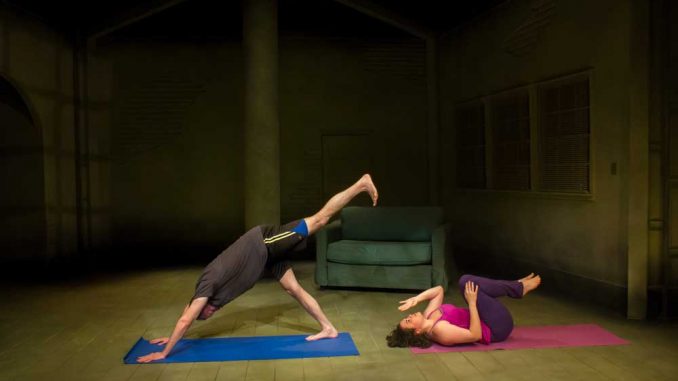
When Davey Strattan White first got the idea for “Liverpudlian Sleeve” he took a break from his commute home from teaching at Montgomery County Community College, and started writing the script outside of a Wawa.
“I was watching the 2010 World Cup, and there were a lot of [referee] controversies,” White said. “I was also teaching an acting class at [Montgomery Community College]. One of my students had also been watching the games, and we were talking about it before class and he said, ‘Man, they’re gonna cut that guy’s d— off.’”
That conversation led White to write the story of Owen, a former soccer star-turned-referee who gets his penis cut off by a crazed female fan after he makes an incorrect call.
“When I was in high school I had my ref license,” White said. “I think I kind of empathized with the idea of doing that to someone.”
Throughout the play, Owen’s relationships, manhood and life are put to the test. The play also explores Kristina’s – Owen’s love interest – anger management issues and her involuntary YouTube fame.
“He’s kind of confronted with the need to define his manhood in a new way and then she’s a yoga teacher with an anger management problem,” White said. “It’s a comedy but for me it’s about gender and about a post-gender age. How do we figure out who the hell we are?”
“Liverpudlian Sleeve” wound up being White’s thesis for his master’s of fine arts degree in playwriting, which he completed in 2012. White had previously received a MFA in acting from Temple in 2003.
“I was in a writers and directors’ class where they paired [directing students and playwriting students] and we had to bring something we were working on, which is nice because in most playwriting classes you have to start a new project with guidelines and you have to work on what Bob [Hedley] wants you to work on. So I was like, ‘I’m working on my detached penis play,’” White said. “It was really fun. Everyone in class was a bit shocked I brought in these scenes.”
Charlie DelMarcelle, the actor who plays Owen, had a chance to read for the part two years ago when White hosted a reading of the play in his living room. It worked out by coincidence that DelMarcelle decided to pursue his MFA in acting the same year “Liverpudlian Sleeve” was selected as one of the main stage shows.
“It was funny because I didn’t know that [DelMarcelle] was coming to Temple at the time. I just thought, ‘Of all the people I know, who would be best for this role? Charlie DelMarcelle,” White said.
DelMarcelle said he is used to working on new productions and he enjoyed the benefit of having the playwright involved in the process of putting the show together.
“It’s a little scary and nerve wracking because things are always changing up to the last minute, [White] was doing a bunch of rewrites, but it’s nice because he’s responding to the work we do in the rehearsal room,” DelMarcelle said. “It’s intense because you want to honor [White’s] work because it’s the first time he gets to see it up.”
In “Liverpudlian Sleeve,” the characters make many references to modern technology such as Siri and Youtube, something that White said hasn’t gone unnoticed.
“Somebody asked me, ‘Why all the technology?’ I told them, ‘Well I’ll answer that after I check my email on my phone,’” White said. “In a given public space, half of the people are using their phones.”
In addition to addressing the modern day use of technology, modern views on gender are also explored.
“I like [White’s] writing,” said David O’Connor, the director of the show. “I have to say overall I’m incredibly tired and bored of writing and directing from straight white men and want more voices but this is a topic I’m interested in hearing a straight white man talk about. Our identity, which has been historically one of power and preeminence, is not as unjust and needs to be evened out and smoothed over. It’s a pretty fun topic to talk about and I’m glad [White ] is writing about it.”
O’Connor added: “Some of the themes this play is grappling with are a lot of contemporary questions of gender roles and how they relate to identity. There’s a kind of refreshing honesty about gender and relationships that’s being talked about in a way that I appreciate.”
Before White was approached to make “Liverpudlian Sleeve” a part of the 2012-13 season, he added scenes that would prove to be technical challenges in Randall Theater, such as a bungee jumping scene.

“While I would love to put my tawdry little show up at the Walnut [Street Theater] I think this will be a play young people will like,” White said.
O’Connor added the play benefited by premiering at Temple as opposed to one of the professional theater companies.
“For the most part at an educational institution, where experimentation is allowed and there’s almost no commercial pressures attached to anything, things can really work on the artistic merits,” O’Connor said. “For the most part, the plays that Temple produces on its main stage are established pieces so at least once a year to work on a play is pretty exciting for everybody to work on something new and to be originating characters.”
Although theater programs at universities tend to focus on established plays, White added that more focus should be put on contemporary plays.
“I think that it’s a problem we don’t do more plays that aren’t now,” White said. “People are like, ‘Shakespeare is still universal today’ and to them I say, ‘You know what else is universal today? Something that was written about today for today.’”
“Liverpudlian Sleeve” runs through April 28.
Luis Fernando Rodriguez can be reached at luis.fernando@temple.edu or on Twitter @theluisfernando.


Be the first to comment